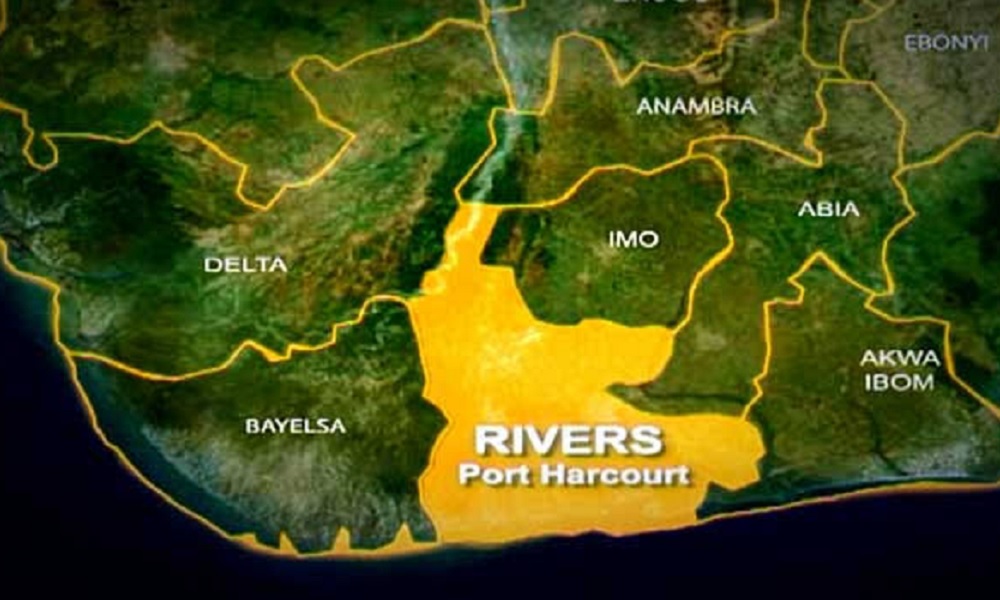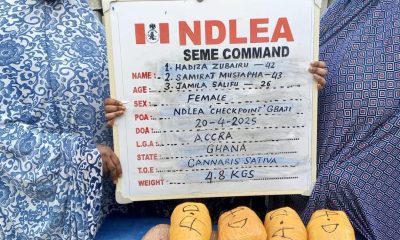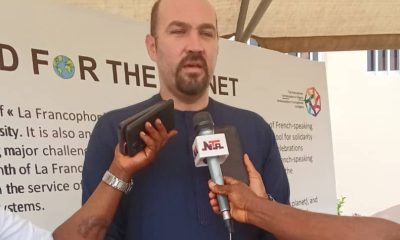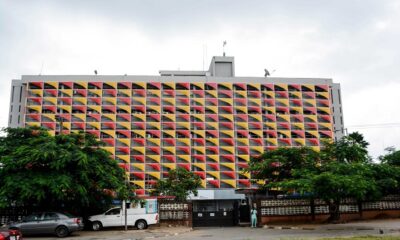News
E-transfer levy: Consumers kick as POS operators raise charges

Operators of Point-of-Sale terminals raised their charges on Monday in line with the implementation of the Electronic Money Transfer Levy of N50 by the Federal Inland Revenue Services charged on any electronic inflow of N10,000 and above.
Several fintech platforms on Sunday notified their customers that they would start the collection of N50 as an Electronic Money Transfer Levy in compliance with the Federal Government Stamp Duty Act, which would be remitted to Federal Inland Revenue Services.
Moniepoint in a mail said, “Please be informed that in compliance with the Federal Government Stamp Duty Act, you would be charged an Electronic Money Transfer Levy of N50 by the Federal Inland Revenue Services on any electronic inflow of N10,000 and above” adding that “FIRS charges you N50 for inflow received in your Moniepoint personal banking account. Moniepoint does not benefit from this but receives and remits this sum to FIRS.”
It clarified that the levy applies to all electronic inflows of N10,000 or more except when the electronic inflow is between Moniepoint accounts owned by the same user.
The Electronic Money Transfer Levy is an N50 charge on mobile money, internet banking and other electronic inflows of N10,000 or more.
PalmPay told its “Dear Valued Customer, In accordance with the Electronic Money Transfer Levy regulation of 2022, a N50 levy will be charged on transfers of N10,000 or more paid into your PalmPay account from November 30th, 2024 as mandated by the Federal Inland Revenue.
“Please note that PalmPay does not benefit from this levy, it is remitted directly to the federal government. PalmPay continues to offer unlimited free transfers to any bank account. We are dedicated to providing affordable and accessible financial services to our valued customers.”
OPay sent a terse message to its customers on the app saying, “Dear customer, in line with the FIRS, the EMTL applies starting December 1st, 2024.”
The Electronic Money Transfer Levy was first introduced through the Finance Act 2020, which expanded the scope of dutiable instruments under the Stamp Duties Act to include electronic transactions.
The regulations guide the imposition, administration, collection, and remittance of the Electronic Money Transfer Levy which was introduced by the Finance Act, 2020. Key provisions include A one-time levy of N50 on the recipient of any electronic receipts or transfers of N10,000 or more.
A POS operator in the Arepo area of Ogun State, Kazeem Adewale, lamented in Yoruba that he had been explaining to customers the reason for the hike in charges since yesterday and was barely coping with annoyed customers.
“I have been explaining and it is tiring. Customers think you want to cheat them but all of us here have had to increase our charges because of this new levy,” he groaned.
A POS operator in Yaba in Ondo town, Mrs Helen Faniran, said, “I haven’t started collecting the charge but I have heard a few of my colleagues saying they would start. One of them said instead of charging N300 for N10,000, she was going to start charging N400.”
Asked why they were charging N300 for N10,000 in the first place, Faniran said “Cash is scarce here. Since morning I have not been able to do any business.”
Asked how she sources her cash, she said, “We buy cash from market women and anyone ready to give us. Before the market women used to give us for free but now they sell to us. That has impacted our profit margin. Ordinarily, it would collect N200 for N10,000 but since we are buying and you have to go through a lot of stress to get your cash, you have to add N100 to it. The market women will give you N100,000 for N2,000 and we will do the same amount for N3,000.”
A POS operator at the Agege area of Lagos State said the charges commence tomorrow(Tuesday). In the Ikotun area of Lagos, a customer said that there had been no increase in charges as of Monday.
Another customer, Deborah Attah, said, “They charged me N600 for N20k when it used to be N400. N5,000 is now N150and N10,000 is N300.”
On social media, bank customers also lamented the hike in POS charges.
A user of the social media platform, X, Sam Addai, lamented, “E levy is one of the most obnoxious taxes. How are we being ‘punished’ for choosing digital money transfers over cash transactions?”
Another X user, 6xstem, said, “Electronic Transfer levy is criminal! Electronic Transfer levy is robbery in broad daylight. Stealing from the citizens indirectly is insane!”
Seige (@OjoPraise), adding his voice said, “My issue with the POS money vendors is they will add more charges when you want to transact anything because of this levy. Imagine you want to withdraw N1,000 and they will say 200 per N1,000. After all, nobody is going to protest or do anything. We are broken!”
Adding a crying emoji to his comments, @chxbueze said, “Government go collect charges, POS too go collect.”
Muritala Mujeed said, “Ohhhh This is the reason why POS users started N100 extra charges on transactions above N10,000. I wanted to pay for fuel this morning and I was shocked by the guy’s ‘shalaye’ (explanation). Toor, it is well o.”
Collins said, “I deposited N12,000 from POS to my account, they still charged me N50 and I paid POS charges. Please what’s going on?”
The initial implementation of the levy in September elicited reactions from Nigerians especially on social media who accused the government of continuously imposing taxes on citizens without notable progress or accountability for how the monies are spent. It was suspended and implementation was moved to December 1st.
As of the time of the initial implementation, economists had warned that the move would ground the fintech space.
Former Chief Economist at Zenith Bank, Marcel Okeke, told The PUNCH that the move was ill-timed and could have far-reaching negative consequences for the economy, particularly in the fintech sector, which has been growing rapidly in recent years.
Okeke argued, “The Federal Government’s move to impose a N50 levy on fintech transactions is driven by a desire to boost revenue. However, this approach may have unforeseen consequences. By targeting digital transactions, the government may inadvertently discourage people from using these services, leading to a demonetisation of the economy,” Okeke said.
Another economist, Alias Aliyu, described the government’s action as a “desperate move” to increase revenue, arguing that the current economic conditions do not justify such a measure.
Credit: PUNCH
News
Just in: Senator Natasha tenders satirical ‘apology’ to Akpabio

In a move that has sent shockwaves through Nigeria’s political landscape, Senator Natasha Akpoti-Uduaghan (PDP, Kogi Central) has penned a biting, satirical letter of “apology” to Senate President Godswill Akpabio, laced with sarcasm and veiled criticism. The letter, which surfaced on social media on Sunday evening. The post read:
From the Desk of Senator Natasha Akpoti Uduaghan
Dear Distinguished Senate President Godswill Akpabio,
It is with the deepest sarcasm and utmost theatrical regret that I tender this apology for the grievous crime of possessing dignity and self-respect in your most exalted presence. I have reflected extensively on my unforgivable failure to recognize that legislative success in certain quarters is apparently not earned through merit, but through the ancient art of compliance — of the very personal kind.
How remiss of me not to understand that my refusal to indulge your… “requests” was not merely a personal choice, but a constitutional violation of the unwritten laws of certain men’s entitlement. Truly, I must apologize for prioritizing competence over capitulation, vision over vanity, and the people’s mandate over private dinners behind closed doors.
I now realize the catastrophic consequences of my actions: legislation delayed, tempers flared, and the tragic bruising of egos so large they require their own postcodes. For this disruption to the natural order of “quid pro quo,” I bow my head in fictional shame.
Please find it in your magnanimous heart — somewhere buried deep beneath layers of entitlement — to forgive this stubborn woman who mistakenly believed that her seat in the Senate was earned through elections, not erections.
I remain,
Yours in eternal resistance,
Senator Natasha H Akpoti Uduaghan
Unafraid, Unbought, and Unbroken
News
FG warns against growing threat of cyber-slavery in West Africa

The Ministry of Foreign Affairs on Sunday raised the alarm over the growing threat of cyber-slavery in West Africa, which is increasingly targeting vulnerable young Nigerians.
In a statement signed by Mr. Kimiebi Imomotimi Ebienfa, spokesperson for the ministry, it was revealed that many young Nigerians, including underage teenagers, are being lured out of the country with false promises of lucrative job opportunities abroad, especially in crypto-related operations.
The warning comes after the recent rescue of about 231 Nigerians who were forced into cybercrime activities in Accra, Ghana.
The victims were rescued and are currently in the custody of the Economic and Organised Crimes Office (EOCO) in Accra.
The government said, “In reality, these individuals are trafficked into sophisticated scam operations and enslaved to work in criminal “call centres” — often referred to as “419 cyber-scam factories.” There, they are forced under coercive and inhumane conditions to send thousands of fraudulent emails, text messages, and calls aimed at defrauding victims worldwide.
“This incident highlights the severe exploitation and abuse associated with cybercrime operations. It also underscores the need for enhanced efforts to combat such multibillion-dollar criminal networks and mitigate the susceptibility of victims.”
The Ministry therefore warned Nigerians, especially the youths and parents, to exercise utmost caution when presented with job offers, particularly those promising easy money, overseas travel, or remote work involving cryptocurrencies.
“Nigerians are therefore advised to verify all employment offers through official channels and report suspicious cases to relevant authorities for necessary investigation and action to curtail the activities of the perpetrators.
“The Ministry wishes to assure the general public that, as a precautionary measure to address this unfortunate situation, the Federal Government is working closely with regional partners, law enforcement agencies, and international organizations to tackle this heinous crime, rescue victims, and bring perpetrators to justice.
“The Ministry remains committed to protecting Nigerian citizens at home and abroad and will continue to raise awareness about emerging threats to the welfare and dignity of our people,” Ebienfa further stated.
News
Rivers pledges support for socio-economic progress, youth development

The Rivers State Government has reiterated its commitment to strategic partnerships and collaborations aimed at enhancing economic growth through sustainable investments.
Also, the state government pledged its continued support for initiatives that drive socio-economic progress and youth empowerment.
The Rivers State Administrator, Vice Admiral Ibok-Ete Ibas (retd.) stated this during a meeting with the leadership of the Unity Schools Old Students Association led by its President-General, Michael Ibrahim Magaji, at Government House, Port Harcourt, on Sunday.
This was contained in a statement issued by the Senior Special Adviser to the Sole Administrator, Hector Igbikiowubo, and sent to newsmen.
The visit followed the successful conclusion of the 3rd USOSA Sports Festival hosted in the State, an initiative designed to promote unity, cultural legacy, and societal impact.
Ibas commended USOSA for choosing Rivers State as the host of the event, describing it as a testament to the state’s peaceful and investment-friendly environment.
He emphasised that the government remains committed to fostering collaborations that stimulate economic benefits while advancing education and sports as key drivers of youth development and social cohesion.
The statement reads, “The Rivers State Government is open to partnerships and collaborations that enhance economic growth through enduring investments.
“We recognize that initiatives like the USOSA Sports Festival not only promote unity but also contribute to the socio-economic vitality of our State. We will continue to support such programs that harness youth potential, create opportunities, and reinforce our collective belief in a prosperous Nigeria.”
Ibas further highlighted the government’s prioritization of education and sports, noting their role in shaping a stable and progressive society.
He assured USOSA of the state’s willingness to consider interventions in unity schools within Rivers State, aligning with the administration’s broader agenda for human capital development.
In his remarks, USOSA President-General Michael Magaji expressed gratitude for the state’s hospitality and reiterated the association’s commitment to fostering national unity through education and sports.
He appealed for government support in rehabilitating facilities in unity schools across the state, a request the administrator pledged to review.
-

 News17 hours ago
News17 hours agoGunmen abduct two senior LG workers, three others
-

 News19 hours ago
News19 hours agoNDLEA storms Lagos hotel, recovers N1.042billion illicit drug consignments(Photos)
-

 News18 hours ago
News18 hours agoArmy Chief condemns beating, harassing civilians in military uniform says, it’s wrong
-

 News2 hours ago
News2 hours agoJust in: Senator Natasha tenders satirical ‘apology’ to Akpabio
-

 News16 hours ago
News16 hours agoFrancophone Ambassadors, Nigeria Unite To Fight Against Climate Change
-

 News11 hours ago
News11 hours agoBenue LG chairman gives Fulanis 48hrs to leave all farmlands
-

 News11 hours ago
News11 hours agoFive suspected kidnappers eliminated by police in Delta
-

 Sports18 hours ago
Sports18 hours agoCopa del Rey: Barca pumel Real Madrid 3-2 to emerge winner

















